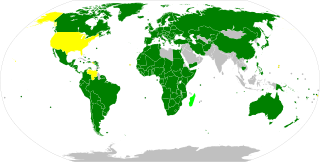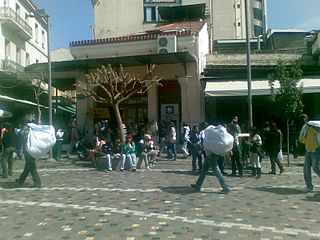Related Research Articles
The United Nations High Commissioner for Refugees (UNHCR) is a United Nations agency mandated to aid and protect refugees, forcibly displaced communities, and stateless people, and to assist in their voluntary repatriation, local integration or resettlement to a third country. It is headquartered in Geneva, Switzerland, with over 18,879 staff working in 138 countries as of 2020.

A refugee, conventionally speaking, is a person who has lost the protection of their country of origin and who cannot or is unwilling to return there due to well-founded fear of persecution. Such a person may be called an asylum seeker until granted refugee status by the contracting state or the United Nations High Commissioner for Refugees (UNHCR) if they formally make a claim for asylum.
An asylum seeker is a person who leaves their country of residence, enters another country and applies for asylum in that other country. An asylum seeker is an immigrant who is making a claim to have been forcibly displaced and might have fled their home country because of war or other factors harming them or their family. If their case is accepted, they become considered a refugee. The terms asylum seeker, refugee and illegal immigrant are often confused.

An internally displaced person (IDP) is someone who is forced to leave their home but who remains within their country's borders. They are often referred to as refugees, although they do not fall within the legal definitions of a refugee.

Termination of employment or separation of employment is an employee's departure from a job and the end of an employee's duration with an employer. Termination may be voluntary on the employee's part (resignation), or it may be at the hands of the employer, often in the form of dismissal (firing) or a layoff. Dismissal or firing is usually thought to be the employee's fault, whereas a layoff is generally done for business reasons outside the employee's performance.

The Convention Relating to the Status of Refugees, also known as the 1951 Refugee Convention or the Geneva Convention of 28 July 1951 is a United Nations multilateral treaty that defines who a refugee is and sets out the rights of individuals who are granted asylum and the responsibilities of nations that grant asylum. The Convention also sets out which people do not qualify as refugees, such as war criminals. The Convention also provides for some visa-free travel for holders of refugee travel documents issued under the convention.
There are tens of thousands of Sudanese refugees in Egypt, most of them seeking refuge from ongoing military conflicts in their home country of Sudan. Their official status as refugees is highly disputed, and they have been subject to racial discrimination and police violence.
World Refugee Day is an international day organised every year on 20 June by the United Nations. It is designed to celebrate and honour refugees from around the world. The day was first established on 20 June 2001, in recognition of the 50th anniversary of the 1951 Convention Relating to the Status of Refugees.

Immigration to Greece percentage of foreign populations in Greece is 7.1% in proportion to the total population of the country. Moreover, between 9 and 11% of the registered Greek labor force of 4.4 million are foreigners. Migrants additionally make up 25% of wage and salary earners.
The Russian Federation's Law on Refugees defines who is a refugee for purposes of obtaining asylum in the country. The Law defines a refugee as a "person who is outside their country of nationality or habitual residence; has a well-founded fear of persecution because of their race, religion, nationality, membership in a particular social group or political opinion; and is unable or unwilling to avail themself of the protection of that country, or to return there, for fear of persecution". Upon receiving an asylum seeker's application, the Russian Migration Service determines whether the asylum seeker meets the legislative definition of a "refugee" and should be granted asylum.
Iraqis in Lebanon are people of Iraqi origin residing in Lebanon and Lebanese citizens of Iraqi ancestry. Statistics for Iraqi refugees in Lebanon vary, but typically put the number at around 50,000.
The United Nations High Commissioner for Refugees Representation in Cyprus is an office of the United Nations High Commissioner for Refugees (UNHCR) opened in August 1974 upon the request of the Government of Cyprus and the Secretary-General of the United Nations. UNHCR Representation in Cyprus was designated as Coordinator of the United Nations Humanitarian Assistance for Cyprus. UNHCR was also responsible upon the request of the Cyprus Government to examine applications for refugee status.

Sudanese refugees in Israel refers to citizens of Sudan who have sought refuge in Israel due to military conflict at home, and to those who moved there illegally as migrant workers. In 2008, there were 4,000 Sudanese in Israel, 1,200 from Darfur and the remainder Christians from South Sudan. The majority entered through the Israeli-Egypt border. Most live in Tel Aviv, Arad, Eilat and Bnei Brak.
Third country resettlement or refugee resettlement is, according to the UNHCR, one of three durable solutions for refugees who fled their home country. Resettled refugees have the right to reside long-term or permanent in the country of resettlement and may also have the right to become citizens of that country.
Migrant workers in the United Arab Emirates describe the foreign workers who have moved to the United Arab Emirates (UAE) for work. As a result of the proximity of the UAE to South Asia and a better economy and job opportunities, most of the migrant foreign workers are from India, Nepal, Sri Lanka, Bangladesh, and Pakistan.
Egypt, which does not border Syria, became a major destination for Syrian refugees since 2012 following the election of Egyptian President Mohamed Morsi, who was a critic of Bashar al-Assad in the Syrian Civil War. As of 2016, there are 114,911 registered Syrian refugees living in Egypt.

The Partnership for Refugees is a refugee public-private partnership established in June 2016 as the Partnership for Refugees by the Obama administration to facilitate President Barack Obama's commitment to creative solutions for the refugee crisis by engaging the private sector. The Partnership, an initiative established through collaboration between the State Department and USA for UNHCR with significant support from Accenture Federal Services, was established to facilitate private sector commitments in response to President Obama's June 30, 2016 Call to Action for Private Sector Engagement on the Global Refugee Crisis. On September 20, 2016, at the Leaders Summit on Refugees at the United Nations, President Obama announced that 51 companies from across the American economy have pledged to make new, measurable and significant commitments that will have a durable impact on refugees residing in countries on the frontlines of the global refugee crisis and in countries of resettlement, like the United States.

Since the onset of the Syrian Civil War in March 2011, over 1.5 million Syrian refugees have fled to Lebanon, and constitute nearly one-fourth of the Lebanese population today. Lebanon currently holds the largest refugee population per capita in the world.

Portugal is generally considered as successful in upholding the civil liberties and protecting the human rights of its citizens. Portugal has proved to be determined in promoting and respecting human rights at an international and national level. The country's minister of Justice as of September 2018, Francisca Van Dunem, said that Portugal has had "a good track record" on human rights but violations still do persist.
As Indonesia did not sign the convention on the status of refugees and lacks any domestic legislations providing refugees rights, refugees in Indonesia do not have the right to employment, permanent residency or citizenship.
References
- ↑ In Guatemala, refugees find new calling as park rangers
- 1 2 Lee, Eun Su; Szkudlarek, Betina; Nguyen, Duc Cuong; Nardon, Luciara (2020). "Unveiling the Canvas Ceiling: A Multidisciplinary Literature Review of Refugee Employment and Workforce Integration". International Journal of Management Reviews. 22 (2): 193–216. doi:10.1111/ijmr.12222. ISSN 1468-2370. S2CID 216204168.
- ↑ Aycan, Zeynep (January 1997). "Expatriate adjustment as a multifaceted phenomenon: individual and organizational level predictors". The International Journal of Human Resource Management. 8 (4): 434–456. doi:10.1080/095851997341540. ISSN 0958-5192.
- 1 2 "Refugee Status Determination" . Retrieved 2023-08-02.
- ↑ "Convention and Protocol Relating to the Status of Refugees" . Retrieved 2023-08-02.
- ↑ Poutvaara, P. and Wech, D. (2016) ‘Integrating Refugees into the Labor Market – a Comparison of Europe and the United States’, CESifo DICE Report. Available at: https://www.cesifo-group.de/DocDL/dice-report-2016-4-poutvaara-wech-december.pdf .
- 1 2 3 4 5 "Engaging with employers in the hiring of refugees - A 10-point multi-stakeholder action plan for employers, refugees, governments and civil society" . Retrieved 2023-08-02.
- ↑ "Harapan's victory promises hope for refugees". Malaysiakini. 2018-05-23. Retrieved 2023-08-02.
- 1 2 Peri, G. (2016) ‘The effect of immigration on productivity: Evidence from U.S. states’, The Economics of International Migration, 49, pp. 265–275. doi : 10.1142/9781
- 1 2 3 Clemens, M. et al. (2018) The Economic and Fiscal Effects of Granting Refugees Formal Labor Market Access. Available at: www.cgdev.orgwww.cgdev.org (Accessed: 4 November 2019).
- ↑ Kallick, D. D. and Roldan, C. (2018) Refugees As Employees: Good Retention, Strong Recruitment.
- ↑ Ortega, F., Edwards, R. and Hsin, A. (2018) The Economic Effects of Providing Legal Status to DREAMers. Available at: www.iza.org (Accessed: 5 November 2019).
- ↑ Todd, L., Amirullah, A. and Shin, W. Y. (2019) ‘The Economic Impact of Granting Refugees in Malaysia the Right to Work’. Available at: www.ideas.org.my.
- ↑ Building Markets and Syrian Economic Forum (2017) Another Side to the Story: A market assessment of Syrian SMEs in Turkey.
- ↑ Paluck, E. L. and Green, D. P. (2009) ‘Prejudice Reduction: What Works? A Review and Assessment of Research and Practice’, Annual Review of Psychology. Annual Reviews, 60(1), pp. 339–367. doi : 10.1146/annurev.psych.60.110707.163607
- ↑ "Refugees, Racism and Xenophobia: What Works to Reduce Discrimination? - Our World". ourworld.unu.edu. Retrieved 2023-08-02.
- ↑ Debating Europe (2018) Do refugees take away jobs? . Available at: https://www.debatingeurope.eu/2018/04/04/refugees-take-away-jobs/ (Accessed: 5 November 2019).
- ↑ "When refugees are exploited by their countrymen – DW – 03/01/2019". dw.com. Retrieved 2023-08-02.
- ↑ "States must treat refugees and migrants as rights holders and act to prevent trafficking and exploitation". OHCHR. Retrieved 2023-08-02.
- ↑ OECD and UNHCR (2016) Hiring refugees-What are the opportunities and challenges for employers?.